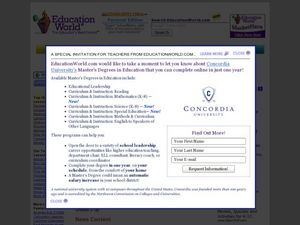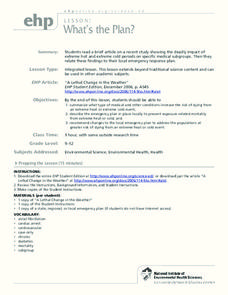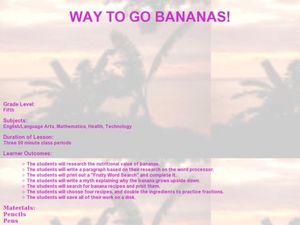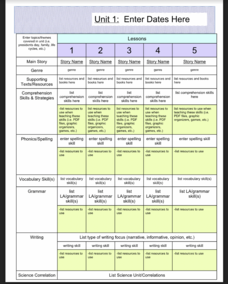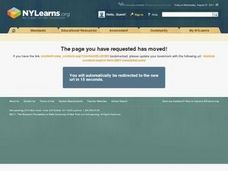Curated OER
The Renaissance Lesson Plans
The Renaissance, Michaelangelo, DaVinci and the Divine Proportion offer Many Exciting Teaching Opportunities
Curated OER
An Interdisciplinary Approach to Learning with Walt Whitman
Use poetry as a mode for creating interest and cross discipline learning.
Curated OER
Looking Back - An Art/English/History Interdisciplinary Unit
High schoolers research historical events of the past century to recognize that society impacts the themes within art and literature. They then interview an individual to develop a biographical narrative, a collage and finally an oral...
Friends of Fort McHenry
Cannons During the War of 1812
During the Battle of Baltimore in the War of 1812, only 25% of the bombs and rockets fired at Fort McHenry actually reached their target. Using an interactive online simulation, combine your historical study with physics and discover why...
University of Georgia
Using Freezing-Point Depression to Find Molecular Weight
Explore the mathematical relationship between a solvent and solute. Learners use technology to measure the cooling patterns of a solvent with varying concentrations of solute. Through an analysis of the data, pupils realize that the rate...
Poetry4kids
How to Write a Clerihew
Writing funny poems is the best part about learning poetic forms! Young poets learn all about clerihews—humorous four-line poems about people—with an explanatory lesson.
Curated OER
Gender, Sex, and Slavery
While examining slavery's impact on women, historians compare and contrast the perspectives of a plantation mistress and an enslaved woman, both reflecting on the system of forced prostitution. Text analysis and written responses create...
Curated OER
Interdisciplinary Applications of Chemistry Through Engineering in Modern Medicine
Students explore the different techniques used in forensic science. In this chemistry activity, students investigate a fictional crime and identify the culprit. They create a brochure or collage career bulletin.
Curated OER
Science: Bees: An Interdisciplinary Approach
Young scholars investigate the world of bees and describe their characteristics. by identifying the bees' parts, they demonstrate how these parts function. In the lab, students dissect bees and view the various parts under microscopes....
Curated OER
Teacher-Astronaut Offers New Lessons
Learners read about teacher-in-space Barbara Morgan and life in space. In this space science and current event lesson, the teacher introduces the article with a vocabulary activity, then students read the news piece and participate in a...
Curated OER
Theatre Lesson Plan- Tableau (part 2)
Students explore tableaux. In this social studies and fine arts cross curriculum lesson, students work in groups of four to create "frozen" stage pictures (tableaux) representing vocabulary and concepts from a "From Farm to You" social...
Curated OER
What's the Plan?
Is there a higher risk of dying on an intensely hot or incredibly cold day? Explore the effects of extreme weather on human health by reading a short article about a study done to address this question. Since the links in the lesson are...
Curated OER
Way to Go Bananas
Fifth graders explore bananas. In this interdisciplinary lesson, 5th graders discover the dietary benefits of bananas, complete a fruits word search, write banana myths, research banana recipes, and use their problem solving skills to...
Newark Public Schools
ELA Curriculum Map
Organize your curriculum of narratives and stories within an ELA unit and keep track of what elements are needed to ensure the unit's success. This curriculum map template allows you to plan for supporting texts, comprehension skills and...
Curated OER
Interdisciplinary Unit On Wellness
Students create a portfolio throughout their middle school years on wellness. Students explore their awareness of the connections between health, physical education, and family and consumer sciences with particular emphasis on the areas...
Baylor College
Heart and Lungs
With a partner, youngsters measure their pulse and breathing rates, both at rest and after running in place for a minute. While this activity is not novel, the lesson plan includes a large-scale classroom graphing activity and other...
Baylor College
Can Nutrients in Water Cause Harm?
Ecology candidates culture pond water organisms over a few days time, then they experiment to find out how increasing nutrients affects the population. As part of a unit on water, this exploration gives your class an understanding of how...
Baylor College
Fuel for Living Things
During a three-part instructional activity, learners make a cabbage juice pH indicator and use it to analyze the waste products of yeast after feeding them with sugar. The intent is to demonstrate how living organisms produce carbon...
Baylor College
Measuring and Protecting Skin
Several subjects are addressed within the context of a science lesson plan about the sun's ultraviolet rays. Elementary earth scientists consider protection of the skin with sunscreens (health), estimating and measuring surface area or...
Baylor College
What Is a One Part Per Million Solution?
Water may appear to be crystal clear, but there could be dissolved substances present. Lab groups make a one-part-per-million of a food coloring solution to demonstrate this concept. As part of an outstanding unit about water, this...
Baylor College
Mapping the Spread of HIV/AIDS
Where is HIV/AIDS most prevalent and what are the current trends regarding HIV? Have groups work together to map the world's HIV/AIDS rates, then create a class map with all the data. Lesson includes cross-disciplinary concepts including...
Core Knowledge Foundation
The U.S. Civil War Tell It Again!™ Read-Aloud Anthology
Over three weeks, second graders listen to stories about the United States Civil War. Informational texts explore the war, slavery, Harriet Tubman, Abraham Lincoln, Robert E. Lee, Clara Barton, the Emancipation Proclamation, and Ulysses...
Core Knowledge Foundation
Third Grade Skills Unit 5: Adventures in Light and Sound
Light and sound are the themes of a unit focused on third-grade skills. Scholars practice spelling patterns, grammar—adverbs, adjectives, synonyms, writing sentences with conjunctions, and listening and responding to read-aloud. Over...
Core Knowledge Foundation
The Human Body—Systems and Senses Tell It Again!™ Read-Aloud Anthology
Nine lessons over three weeks explore the human body through read-alouds. Third graders listen to and discuss a reading followed by extension activities, including word work and comprehension practice. Learners draft a narrative essay.











